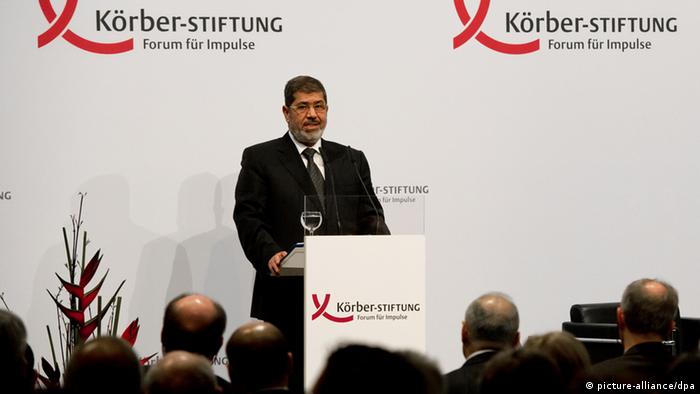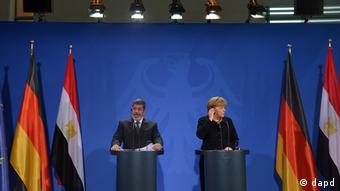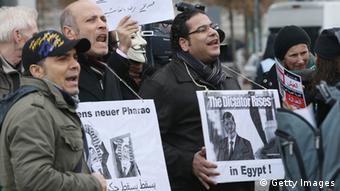Mohammed Morsi had little time to spare during his visit to Berlin after his talks with Chancellor Angela Merkel, but he did find space in his schedule for a speech - and some awkward questions.
It was a sophisticated audience that had come to hear the speech of Egyptian President Mohammed Morsi - around 200 diplomats, academics, politicians, and students filled a large hall in the Körber Foreign Policy Forum in Berlin. They waited patiently for the president, who arrived very late for his last appointment in the German capital. When the 61-year-old finally arrived, after a long day of political discussions, he cut a proud, self-confident figure.
Democratically elected
He called himself Egypt's first democratically elected, civilian president, and added that he was speaking from a position of true legitimacy, bestowed on him by the Egyptian people in free elections. But he added that the presidential elections had merely been the first step on the path to the establishment of a civilian state. His aim, he said, was to build up Egypt, both economically and socially.
Morsi underlined that the 2011 revolution, which ended the regime under Hosni Mubarak, was a source of self-confidence for his country. "The revolution did not break out in a moment of rage, and it wasn't a 'spring,' and not an awakening from a long sleep," he said.
"This revolution, like the other revolutions in the region, was much more the result of national movements and the expression of the hopes of whole generations."
Equal dialogue
The president also accused Western governments of supporting the dictatorial regimes in the Arab world for decades, a policy that had had immoral and inhumane results. For the future, he demanded a dialogue between equal partners. "Neither side must presume to offer the other advice, or claim that their side has all the wisdom, or believe that they stand above the other," he said.
Within Egypt too, he said his aim was to engage in a dialogue between social groups, and to find the widest national consensus possible. He said that Cairo would once again play a leading role in the region in the search for peace and stability.
By that token, he called for dialogue in Syria, where the bloodletting, he said, must be ended, as well as in the Israeli-Palestinian conflict. He argued that the Palestinians had a right to self-determination within their own state, that the Israeli occupation was illegal, and that the Palestinians had the right to defend themselves against it.
Awkward questions
After the half-hour speech, Morsi was questioned by Georg Mascolo, journalist from news magazine Der Spiegel, who had moderated the evening. The president remained impassive when Mascolo brought up a video that had recently emerged in which Morsi was recorded making anti-Israeli statements, and drawing comparisons to pigs and monkeys.
The president contended that his remarks had been taken out of context, and that they had been part of a discussion of violent Israeli policies. He said it was unacceptable for Israel to spill the blood of Palestinian children, but that he had not intended to attack the Jewish people or Judaism, and that he respected all religions.
Morsi evaded a question on a ban on alcohol and bikinis. He said that religious freedom governed Egypt, where anyone could do what he or she wanted as long as they did not harm others.
Morsi also rejected statements by the German government's human rights commissioner Markus Löning, who had recently complained that the human rights situation in Egypt was worse than it had been before the revolution. This, Morsi said, was untrue - he admitted that there had been some violations, but that the government would not tolerate them. Egypt, he pointed out, was still in a transitional phase, and needed patience.
Morsi returned to Cairo on Wednesday evening, having declared that he must fulfil his many duties at home. But he offered some reassuring words on his departure: Egypt, he insisted, was not about to collapse. dw de



No comments:
Post a Comment